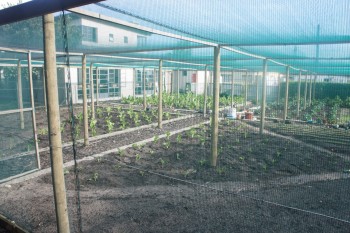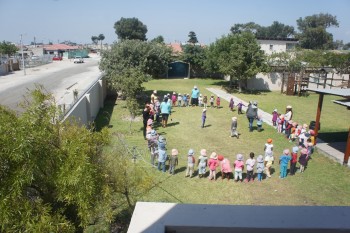by Shannon Gillie
In March of this year, I had dinner with a group of ten other NU students who were also on their co-ops in Cape Town, South Africa. If there’s anything NU students love to talk about, it’s our co-ops, and they were our topic of conversation for much of the evening. Given the diversity of the city, perhaps the differences in our experiences shouldn’t have surprised me so much. But they did. As we went around the table with our tales, I began to get a sense of how unique each person’s story was, and was reminded that my own Cape Town story was one of thousands.
I spent six months in Cape Town this year working at Etafeni, a nonprofit organization in the township of Nyanga that runs holistic programs to reduce the impact of HIV and AIDS on the community. I spent most of my time there working closely with the twelve different program managers to develop a new Monitoring and Evaluation (M&E) system. My days were sprinkled with one-on-one meetings, online research (when the wifi was working), and bigger picture discussions with my supervisor. How did our programs, spanning topics from early childhood care to work-skills training, truly impact our beneficiaries? And how could we improve that impact?
 It’s impossible to improve programs if we don’t understand the challenges faced by Etafeni’s employees. Our program managers have their own stories of how they came to Etafeni, what their challenges are, and how the individuals in their programs are doing. Learning about all of these pieces was a highlight of my time at Etafeni, not just because it helped develop thoughtful M&E tools, but because my own knowledge store grew tremendously. I had questions answered about how the taxi system worked, for example, and can now tell you how bad cauliflower white moths are for our on-site vegetable garden. Notably, the legacy of apartheid is still very prevalent in Cape Town, and learning bits and pieces of that history from our staff provided no shortage of valuable discussions as well.
It’s impossible to improve programs if we don’t understand the challenges faced by Etafeni’s employees. Our program managers have their own stories of how they came to Etafeni, what their challenges are, and how the individuals in their programs are doing. Learning about all of these pieces was a highlight of my time at Etafeni, not just because it helped develop thoughtful M&E tools, but because my own knowledge store grew tremendously. I had questions answered about how the taxi system worked, for example, and can now tell you how bad cauliflower white moths are for our on-site vegetable garden. Notably, the legacy of apartheid is still very prevalent in Cape Town, and learning bits and pieces of that history from our staff provided no shortage of valuable discussions as well.
The individual meetings reflected a key lesson from the 2014 South Africa dialogue, the experience that led me to returning for this co-op. The second half of the dialogue was titled “Ethnograp hy to Enterprise”, which I certainly didn’t understand when I saw it on the itinerary. As our dialogue split into group projects, however, it began to make sense. By working directly with organizations in Cape Town, we were able to practice the skills of ethnography, which as it turns out, focus primarily on one’s ability to listen. It’s very easy to learn about why projects fail when we’re sitting in a classroom in Boston, but by practicing ethnographic skills, we gain confidence that our contributions can be useful. Ethnography provides a solution to a dilemma familiar to many social entrepreneurship students, the question of “Am I really needed here? Or am I just serving my own desire to ‘make a difference’?” With the right tools, we can all make a difference.
hy to Enterprise”, which I certainly didn’t understand when I saw it on the itinerary. As our dialogue split into group projects, however, it began to make sense. By working directly with organizations in Cape Town, we were able to practice the skills of ethnography, which as it turns out, focus primarily on one’s ability to listen. It’s very easy to learn about why projects fail when we’re sitting in a classroom in Boston, but by practicing ethnographic skills, we gain confidence that our contributions can be useful. Ethnography provides a solution to a dilemma familiar to many social entrepreneurship students, the question of “Am I really needed here? Or am I just serving my own desire to ‘make a difference’?” With the right tools, we can all make a difference.


